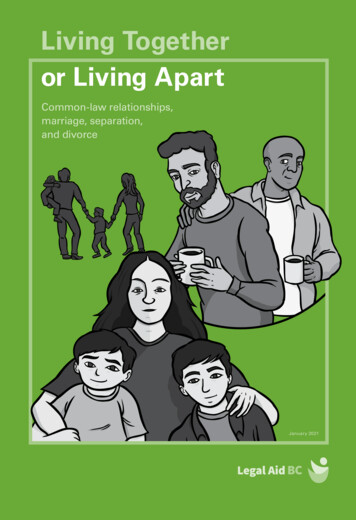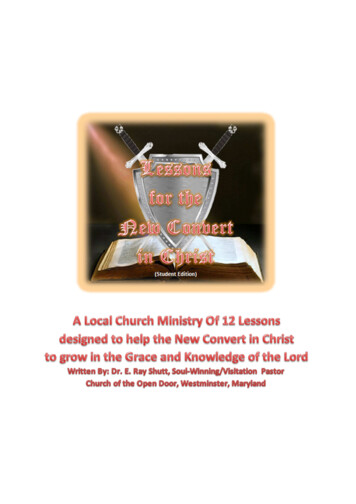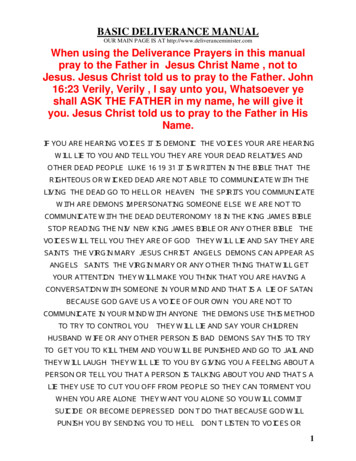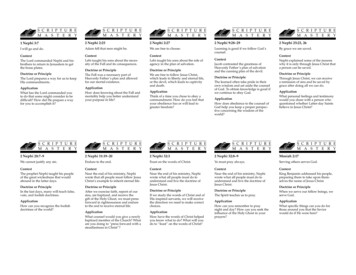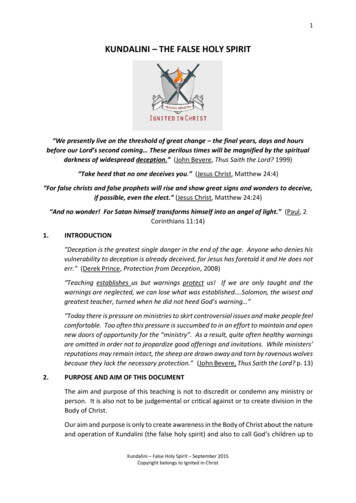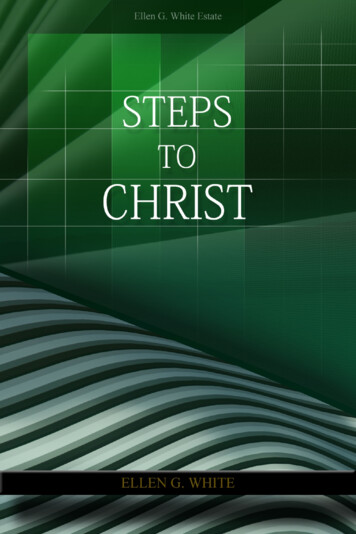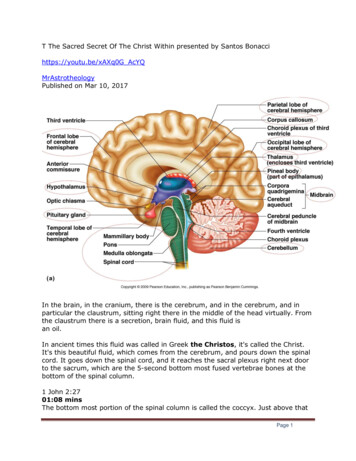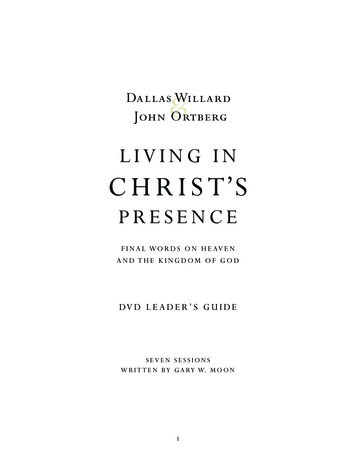
Transcription
Dallas WillardJohn OrtbergLiving inC h r i s t’sPresenceF i n a l W o r d s o n H e av e na n d t h e K i n g do m of GodDV D L e a d e r ’ s G u i d eseven SessionsW r i t t e n b y G a ry W. Moo n1
2
Living inC h r i s t’sPresenceF i n a l W o r d s o n H e av e na n d t h e K i n g do m of Godseven SessionsD a ll a s W i ll a r da n d J o h n O rt b e r g3
Copyright 2013 by Jane Willard, John Ortberg and the Dallas Willard Center for Spiritual FormationScripture quotations are taken from the New Revised Standard Version Bible, copyright 1989, Division of ChristianEducation of the National Council of the Churches of Christ in the United States of America. Used by permission. All rightsreserved.4
ContentsPrefaceGary W. MoonFor Starters1 How to Live Well: Eternal Life Begins NowConversation: Dallas Willard and John OrtbergDallas Willard2 Who Are the Experts on Life Transformation?Questions and Answers with John OrtbergJohn Ortberg3 How to Step into the Kingdom and Live ThereConversation: Dallas Willard and John OrtbergDallas Willard4 Experiential Knowledge of the TrinityConversation: Dallas Willard and John OrtbergJohn Ortberg5 Understanding the Person: Including the Invisible PartsConversation: Dallas Willard and John OrtbergDallas Willard6 The Importance of Christian DisciplinesConversation: Dallas Willard and John OrtbergDallas Willard7 BlessingDallas WillardAlso from InterVarsity Press5
PrefaceGary W. MoonI believe that church history will be very kind to Dallas Willard. He lived his life as a rare composite of rigorousacademic, passionate Bible expositor and friend of God. Those who knew him well marveled at his mind butloved him because of his firsthand knowledge of God and his desire for others to share his experiences of lifein the kingdom.More than ten years ago, I was working for a publisher on a project to present an overview of what was, atthe time, Dallas’s trilogy: In Search of Guidance (later released as Hearing God), The Spirit of the Disciplines andThe Divine Conspiracy. The idea was that Dallas would be filmed teaching the core concept of each book: (1)the possibility of living in a conversational relationship with God; (2) how students of Jesus can interact withthe grace and Spirit of God; and (3) eternal living starts here and now through confidence in Jesus. After mostof the research had been completed for the project, the trilogy became a gospel quartet with the release ofRenovation of the Heart. Vision for the project shifted to the fourth book, and the overview project was put onhold—until now.The book in your hands has been created from the transcript of a conference held February 21-23, 2013,in Santa Barbara, California. The conference was born out of conversations between Dallas and John Ortberg,senior pastor at Menlo Park Presbyterian Church in Menlo Park, California, and a gifted author and speaker.The primary passion for the conference was to provide an overview of Dallas’s writings and ministry—hismost impassioned ideas. The conference was built around the theme “Knowing Christ Today” and as a wayto present the golden thread that runs through all of his primary writing: that it is possible to know the Trinityintimately and to step into their glorious kingdom.The talks at the conference by Dallas and John have been edited just a bit to make the transition to createthe book Living in Christ’s Presence: Final Words on Heaven and the Kingdom of God, but they retain the conversational feel of a conference. At the start of each chapter of the book is one of the prayers that was prayedduring the conference. Each chapter ends with a conversation about the content with further content beingdrawn out with questions from John to Dallas and from the audience. The DVD of the talks is the focal pointof this study guide.The conference was sponsored by the Martin Institute for Christianity and Culture and the Dallas WillardCenter for Christian Formation (MIDWC), where I serve as executive director. The MIDWC exists becauseof the vision and generosity of Eff and Patty Martin. I believe that the DVD and study guide will capture andpreserve the nature of the conference—and more importantly, Dallas’s thoughts—in a way that will be helpfulto you.6
For StartersThanks for choosing this InterVarsity Press small-group video curriculum. Please take a couple of minutes toread this helpful information before you begin. It should answer most questions you may have.What’son the video ?The accompanying video features the following components: Seven teaching sessions with either Dallas Willard or John Ortberg Five conversations between Dallas and John One question-and-answer sessions with John and the audience Previews of other products your small group might want to consider sometime in the futureWhatother materials are needed for a successful small group ? Television monitor Video player (stand, extension cord and so on) Watch or clock for monitoring time Leader’s guide Bible—Old and New Testament (one per group member) Notepad and pen or pencil for everyoneWhatelse doIneed to know ? This curriculum can work equally well in church and home groups. Each of the first six sessions can beexperienced in approximately 120 minutes. The seventh session runs less than sixty minutes. In moreformal, time-sensitive church settings, leaders will likely need to follow the time frames provided in thesession outline closely to finish all the content. In less formal home settings, leaders can be more flexible.In either case, remember these are suggested time frames that can be adjusted as you see fit. It is likely that you will want to take thirteen sessions instead of seven to complete these materials. If youchoose to do this, we suggest taking two sessions to compete each of the twelve chapters, devoting onesession to the lecture by either Dallas or John and a second session for the conversation or question-andanswer time that follows the lecture. The last session, chapter 7 (which would be the thirteenth session inthis format) requires only one hour, so it does not need to be divided. Feel free to adapt each session to your particular group. Reword or add questions if you wish. If you sensea certain question is too inflammatory for your group or reaches beyond your comfort zone, simply omitit or at least recognize that not everyone needs to answer every question. Above all, approach these sessionswith an expectant spirit that God will stretch the heart and mind of each participant. For further insights, please read and recommend to your group Dallas Willard and John Ortberg’s Living inChrist’s Presence: Final Words on Heaven and the Kingdom of God, the book on which this curriculum is based(available in March 2014).7
Session 1How to Live WellEternal Life Begins NowBefore You LeadFor the best experience in leading your small group, it’s very important to preview session 1 of the video.Familiarize yourself with the session outline and gather the necessary materials.Session OutlineI. Introduction (4 minutes)A. Welcome and opening prayer (1 minute)B. Question response (3 minutes)II. Video Teaching (90 minutes for one session format; the conversation between Dallas and John begins atthe 44:05 mark)III. Video Discussion (10-15 minutes)IV. Closing (3 minutes)Note: You should be able to complete chapter 1 in either one two-hour block or two one-hour blocks.IntroductionWelcome participants to the study, and briefly pray if you would like. You may want to say a word about theoverall theme for the next six weeks and ask the group how they feel about taking the time to focus on thetopic for this session: how to live well.You may want to solicit responses from the group concerning the question “What does it mean to live well,to be well off?”Video TeachingShow the video segment for this session. Participants may wish to use a notepad and pen or pencil for takingnotes.Video DiscussionAfter the video presentation, explore the topic further by allowing the group to consider the following questions:1. Dallas says, “When you divorce faith from knowledge, you wind up in the position of trying to get peopleto do things, not of providing them with a basis on which they can then decide how to live and how tolead their lives together.” How would you explain the difference between faith and knowledge? (Hint:Biblically speaking, to “know” another person always implies intimate interaction.)8
How to Live Well2. What do you think it means to pull rather than push someone into discipleship?3. What is your gospel, your central message? (Hint: Is your gospel built more around an arrangement madeor a relationship being lived?)Note: If your group has decided to split the material into two sessions, ask the following questions after viewing theconversation between Dallas and John.1. What does Dallas mean when he says, “The test of religious life is life?”2. What needs to be true in someone’s life for that person to be able to say he or she knows Christ?3. How does having an intimate and ongoing knowledge of Christ relate to living life with a light burden andeasy yoke?ClosingBefore wrapping up, encourage the participants to read and reflect on the following passages before the nextgroup meeting. Matthew 11:28-30Easy yoke Matthew 28:18-20The Great Commission John 17:3The only time in the Bible that Jesus defines “eternal life”Close with prayer. Perhaps you’ll want to lead in a prayer for each member to be willing to experience God’sinvitation to live now as his friend and student.Additional ReadingWillard, Dallas. The Divine Conspiracy: Rediscovering Your Hidden Life in God. San Francisco: HarperSanFrancisco, 1998. (See chapter 1: “Entering the Eternal Kind of Life Now.”)9
Session 2Who Are the Expertson Life Transformation?Before You LeadFor the best experience in leading your small group, it’s very important to preview session 2 of the video.Familiarize yourself with the session outline and gather the necessary materials.Session OutlineI. Introduction (4 minutes)A. Welcome and opening prayer (1 minute)B. Question response (3 minutes)II. Video Teaching (77 minutes for one session format; audience question-and-answer session with Johnbegins at 46:48)III. Video Discussion (12-15 minutes)IV. Closing (3 minutes)Note: You should be able to compete the session in either one two-hour block or two one-hour blocks.IntroductionWelcome participants to the study, and briefly pray if you would like. You may want to see if anyone has aquestion from the last session’s lesson and reflections, or you may want to say a word about the overall themefor this session: who are the experts on life transformation?You may want to solicit responses from the group concerning the question “Did you have any experienceswith easy-yoke living in the past few days? If yes, please say more.”Video TeachingShow the video segment for this session. Participants may wish to use a notepad and pen or pencil for takingnotes.Video DiscussionAfter the video presentation, explore the topic further by allowing the group to consider the following questions:1. Who do you know that is an expert in life transformation? How does one become such a person?2. What are some of the differences between accepting Jesus as your teacher and accepting him as yoursavior?3. What would you most want to be said at your funeral? If all these things are already true about you, won-10
Who Are the Experts on Life Transformation?derful! If some of the statements are not fully true, what have you learned about how to become a genuinely good person?4. How would you describe the difference between the gospel of Jesus and the gospel of minimum entrancerequirements? (Hint: Feel free to quote Monty Python.)Note: If your group has decided to split the material into two sessions, ask the following questions after viewing theconversation between Dallas and John.1. What is the real test of what a person actually believes?2. What is the value of true belief?3. If you were to develop a measure of spiritual maturity so that a scribe or Pharisee would not win, whatitem you would have on your test?ClosingBefore wrapping up, encourage the participants to read and reflect on the following passages before the nextgroup meeting. Psalm 1The two ways Mark 1:14-15The gospel of Jesus 1 Corinthians 1:17-31The shortcomings of human wisdom 1 Corinthians 13; 2 Peter 1:1-11;Colossians 3:1-17What transformed (good) people look likeClose with prayer. Perhaps you’ll want to lead in a prayer for each member to be willing to experience God’sinvitation to live in a conversational and transforming relationship.Additional ReadingWillard, Dallas. Knowing Christ Today: Why We Can Trust Spiritual Knowledge. New York: Harper Collins, 2009.(See chapter 8: “Pastors as Teachers of the Nations.”)11
Session 3How to Step into theKingdom and Live ThereBefore You LeadFor the best experience in leading your small group, it’s very important to preview session 3 of the video.Familiarize yourself with the session outline and gather the necessary materials.Session OutlineI. Introduction (4 minutes)Welcome and opening prayer (1 minute)Question response (3 minutes)II. Video Teaching (78 minutes; the conversation between John and Dallas begins at 40:55)III. Video Discussion (12-15 minutes)IV. Closing (3 minutes)Note: You should be able to compete the session in either one two-hour block or two one-hour blocks.IntroductionWelcome participants to the study, and briefly pray if you would like. You may want to see if anyone has aquestion from the last session’s lesson and reflections, or you may want to say a word about the overall themefor this week: how to step into the kingdom and live there.You may want to solicit responses from the group concerning the question “What does the phrase, ‘kingdomof God’ mean to you?”Video TeachingShow the video segment for this session. Participants may wish to use a notepad and pen or pencil for takingnotes.Video DiscussionAfter the video presentation, explore the topic further by allowing the group to consider the following questions:1. Dallas Willard says that the first step toward living in the kingdom is to study Christ and his gospel ofkingdom availability. Given that through Christ the kingdom is a here-and-now reality, how would youdescribe your part in learning to live in the kingdom now?2. Dallas suggests “ventur[ing] on Christ” and his teaching as the next step into experiencing life in thekingdom—the test of experience. What have been some of your experiences of living more and more moments with God? (Hint: Living in the kingdom is a matter of living with God’s actions in our lives.)12
How to Step into the Kingdom and Live There3. Second Corinthians 5:17 states, “If anyone is in Christ, he is a new creation; the old has gone, the new hascome!” What do you think Dallas meant by saying that this is one of the most abused passages in all ofScripture?4. What is beyond the righteousness of the scribes and Pharisees?Note: If your group has decided to split the material into two sessions, ask the following questions after viewing theconversation between Dallas and John.1. What does it look like for you to be seeking the kingdom in your work, play and intimate relationships?2. What is the best thing to do if you discover that seeking the kingdom is not your number-one priority?3. Dallas has often said, “If you want to go to heaven, go now.” How does that idea relate to living in thekingdom now?ClosingBefore wrapping up, encourage the participants to read and reflect on the following passages before the nextmeeting: Ephesians 2:1-10; John 3:1-8God’s part Matthew 5:20-48; 11:25; 18:1-4Our part Matthew 6:33Our first priority Jeremiah 29:13; 2 Chronicles 15:4, 15;Matthew 13:13-15Why seeking is required John 8:31-32The path of knowledge for the discipleClose with prayer. Perhaps you’ll want to lead in a prayer for each member to be willing to personally experience God’s invitation to live all of life as his apprentice.Additional ReadingWillard, Dallas. The Divine Conspiracy: Rediscovering Your Hidden Life in God. San Francisco: HarperSanFrancisco, 1988. (See chapter 3: “What Jesus Knew: Our God-Bathed World.”)13
Session FourExperientialKnowledge of the TrinityBefore You LeadFor the best experience in leading your small group, it’s very important to preview session 4 of the video.Familiarize yourself with the session outline and gather the necessary materials.Session OutlineI. Introduction (4 minutes)Welcome and opening prayer (1 minute)Question response (3 minutes)II. Video Teaching (50 minutes; the conversation between John and Dallas starts at the 34:12 mark)III. Video Discussion (12-15 minutes)IV. Closing (3 minutes)IntroductionWelcome participants to the study, and briefly pray if you would like. You may want to see if anyone has aquestion from the last session’s lesson and reflections, or you may want to say a word about the overall themefor this week: experiential knowledge of the Trinity.You also may want to solicit responses from the group to the question “What difference would it make inhow you live if you believe that you are created to live in a continuing, transforming conversation with theTrinity?”Video TeachingShow the video segment for this session. Participants may wish to use a notepad and pen or pencil for takingnotes.Video DiscussionAfter the video presentation, explore the topic further by allowing the group to consider the following questions:1. What do you think life among the members of the Trinity is like? How does that vision challenge you asyou live in communities of work, family and friends?2. John Ortberg stated, “We have been invited into the fellowship of love through the gracious ministry ofthe Holy Spirit at enormous cost to every member of the Trinity.” What are some of the ways you havefound to live in a greater awareness of this reality?3. On a scale of one to ten, how true is it that you are routinely restful and joyous in serving and ministry?14
Experiential Knowledge of the Trinity4. Share some ideas for arranging your life so that you are experiencing deep contentment, joy and confidencein your everyday life with God.Note: If your group has decided to split the material into two sessions, ask the following questions after viewing theconversation between Dallas and John.1. How would you describe to someone else what Dallas described as the “practical presence of the Trinity”in a person’s life?2. Read Philippians 2:5-11 (the “Hymn of Christ”). How should people go about imitating Christ in beingwilling to “empty” themselves (to use Dallas’s translation) of the desire for reputation?3. What are some practical suggestions for churches (and individuals) for getting beyond separation andcompetition?ClosingBefore wrapping up, encourage the participants to read and reflect on the following passages before the nextmeeting: Ephesians 4:1-6The unity of the Spirit John 13:34; 1 John 2:8A “new command” John 14:15-31What happens when the Trinity comes to live in us John 17:21-24A growing community of love in constant interaction with the TrinityClose with prayer. Perhaps you’ll want to lead in a prayer for each member to be willing to experience God’sinvitation to know the Trinity as a community of love.Additional ReadingJohnson, D. W. Experiencing the Trinity. Vancouver, BC: Regent College Publishing, 2002.15
Session FiveUnderstanding the PersonIncluding the Invisible PartsBefore You LeadFor the best experience in leading your small group, it’s very important to preview session 5 of the video and,if possible, follow along in chapter 5 of the book Living in Christ’s Presence. Familiarize yourself with thesession outline and gather the necessary materials.Session OutlineI. Introduction (4 minutes)Welcome and opening prayer (1 minute)Question response (3 minutes)II. Video Teaching (65 minutes; the conversation between John and Dallas begins at 34:49)III. Video Discussion (12-15 minutes)IV. Closing (3 minutes)IntroductionWelcome participants to the study, and briefly pray if you would like. You may want to see if anyone has aquestion from the last session’s lesson and reflections, or you may want to say a word about the overall themefor this week: understanding the person, including the invisible parts.You also may want to solicit responses from the group to the question “Of the five things you can do—think,feel, choose, behave and relate—which has been the most helpful to your own spiritual formation?”Video TeachingShow the video segment for this session. Participants may wish to use a notepad and pen or pencil for taking notes.Video DiscussionFollowing the video presentation, explore the topic further by allowing the group to consider the followingquestions:1. Dallas states, “One of the things that defeats Christian growth is failure to attend to the parts of the person.”He then references the admonition in Romans 12 to present your body as a living sacrifice. What are someways that you have presented any of the aspects of you (thoughts, feelings, behavior/body, will, relationships) as a living sacrifice?2. What do you think Dallas meant by saying that experiences of practicing the spiritual disciplines are notthe same for everyone?16
Understanding the Person3. What does it mean to love God with you whole heart? (Hint: To love someone means to desire that person’sgood.) What are some things that would be good for God?4. In terms of habits, what are the spiritual disciplines designed to do?5. How does a person get to a place of easy, routine obedience?Note: If your group has decided to split the material into two sessions to complete the first topic, ask the followingquestions after viewing the conversation between Dallas and John.1. What does Dallas suggest should be done to help a person who has become frustrated by how difficult itis to change? Can you give an example of what this looks like in your own life?2. What might happen if you become stuck on fixing or changing a behavior?3. What are the roles of grace and the Trinity in the practice of a spiritual discipline?ClosingBefore wrapping up, encourage the participants to read the following passages before the next group meeting: Mark 7:20-23Where human failure and misery come from Mark 12:29-31The Great Commandment—love of God and neighbor Psalm 19Restoring the soulClose with prayer. Perhaps you’ll want to lead in a prayer for the group to celebrate the gifts brought by eachcomponent of our personhood.Additional ReadingWillard, Dallas. Renovation of the Heart. Colorado Springs, CO: NavPress, 2002.17
Session SixThe Importance ofChristian DisciplinesBefore You LeadFor the best experience in leading your small group, it’s very important to preview session 6 of the video and,if possible, follow along in chapter 6 of the book Living in Christ’s Presence. Familiarize yourself with thesession outline and gather the necessary materials.Session OutlineI. Introduction (4 minutes)Welcome and opening prayer (1 minute)Question response (3 minutes)II. Video Teaching (77 minutes; the conversation between John and Dallas starts at 56:48) (Note: You maywant to view part of John’s talk during your next session to balance viewing time.)III. Video Discussion (12-15 minutes)IV. Closing (3 minutes)IntroductionWelcome participants to the study, and briefly pray if you would like. You may want to see if anyone has aquestion from the last session’s lesson and reflections, or you may want to say a word about the overall themefor this week: the importance of Christian disciplines.You also may want to solicit responses from the group to the question “What is the current role of Christiandisciplines in your life?”Video TeachingShow the video segment for this session. Participants may wish to use a notepad and pen or pencil for taking notes.Video DiscussionAfter the video presentation, explore the topic further by allowing the group to consider the following questions:1. After listening to John Ortberg’s reading of Colossians 3:1-14 and 2 Peter 1-11, are there any practices youhave found to be helpful for making these verses a reality in your life?2. When it comes to authentic Christian spiritual formation, how would you explain the difference betweentraining and trying?3. If any activity has the potential to be a spiritual discipline for a person (such as purposefully driving inthe slow lane), what are some activities that could become a spiritual discipline in your life? Is the activitya discipline of abstinence or engagement?18
The Importance of Christian DisciplinesNote: If your group has decided to split the material into two sessions, ask the following questions after viewing theconversation between Dallas and John.1. What is your plan for becoming more aware of other disciples (apprentices to Jesus) in your area? Howcan you encourage each other in practical ways?2. If discipleship is, as Dietrich Bonheoffer described, simply the reception of grace, how can a spiritualdiscipline play a role in receiving grace?3. What is bothering you?ClosingBefore wrapping up, encourage the participants to read the following passages before the next group meeting: Colossians 3:1-14; 2 Peter 1:1-11Exercising responsibility for who we become 1 Corinthians 9:24Training versus trying Galatians 5:22-25Spiritual disciplines and the fruit of the SpiritClose with prayer. Perhaps you’ll want to lead in a prayer for each member to be willing to find ways of arranging life to form new life-giving habits.Additional ReadingWillard, Dallas. The Spirit of the Disciplines. San Francisco: Harper & Row, 1988.19
Session SevenBlessingBefore You LeadFor the best experience in leading your small group, it’s very important to preview session 7 of the video.Familiarize yourself with the session outline and gather the necessary materials.Session OutlineI. Introduction (4 minutes)Welcome and opening prayer (1 minute)Question response (3 minutes)II. Video Teaching (36 minutes; present this recording in one session; Dallas’s talk is the first 26 minutes ofa total of 36)III. Video Discussion (12-15 minutes)IV. Closing (3 minutes)IntroductionWelcome participants to the study, and briefly pray if you would like. You may want to see if anyone has aquestion from the last session’s lesson and reflections, or you may want to say a word about the overall themefor this week: blessing.You also may want to solicit responses from the group to the following: “Describe a time when you havereceived a blessing from another person that had a healing effect on your soul.”Video TeachingShow the video segment for this session. Participants may wish to use a notepad and pen or pencil for takingnotes.Video DiscussionFollowing the video presentation, explore the topic further by allowing the group to consider the followingquestions:1. How would you explain the difference between a blessing and a curse?2. What do you mean when you say to another person, “God bless you.”3. Have you ever had the sense of God looking right at you?20
BlessingClosingEncourage the participants to pair into groups of two and to bless each other with the Aaronic blessing:The Lord bless you and keep you;the Lord make his face to shine upon you, and be gracious to you;the Lord lift up his countenance upon you, and give you peace. (Numbers 6:25-26 nrsv)Close with prayer. Perhaps you’ll want to lead in a slow reading of Dallas’s paraphrasing of the Lord’s Prayer:Dear Father always near us,may your name be treasured and loved,may your rule be completed in us,may your will be done here on earth in just the way it is done in heaven.Give us today the things we need today,and forgive us our sins and impositions on youas we are forgiving all who in any way offend us.Please don’t put us through trials,but deliver us from everything bad.Because you are the one in charge,and you have all the power,and the glory too is all yours—forever.Which is just the way we want it!Additional ReadingWillard, Dallas. The Great Omission. San Francisco: Harper & Row, 2006.21
Book Also from InterVarsity PressAvailable March 2014ISBN 0-8308-358422
The Divine Conspiracy. The idea was that Dallas would be filmed teaching the core concept of each book: (1) the possibility of living in a conversational relationship with God; (2) how students of Jesus can interact with the grace and Spirit of God; and (3) eternal living st
